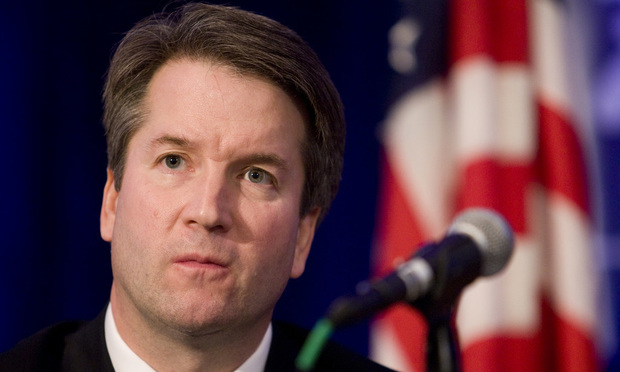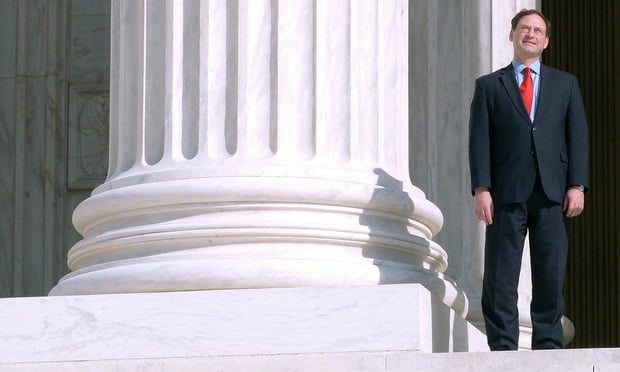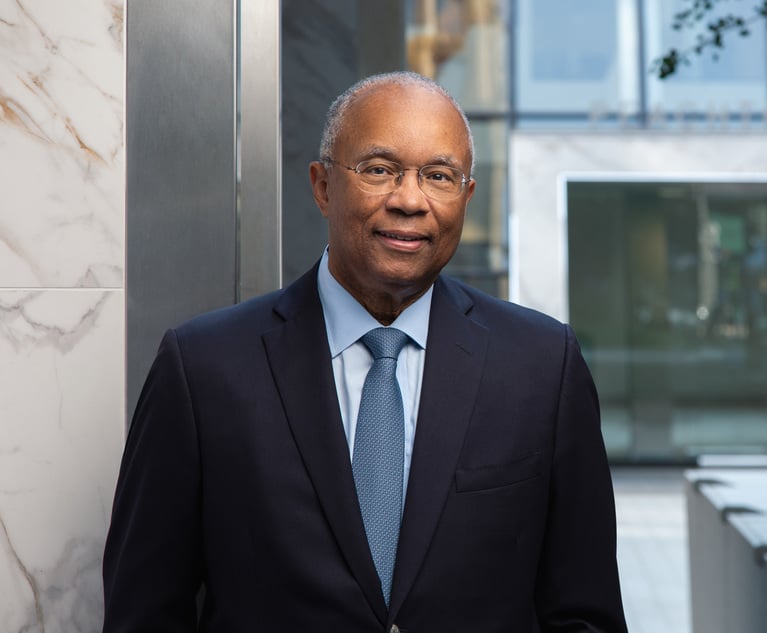Kavanaugh Touts 'Team of Nine.' Justice Holmes Saw It Differently: 'Nine Scorpions in a Bottle'
More than any phrase, Brett Kavanaugh repeatedly has said he aspires to be a member on the "team of nine" at the U.S. Supreme Court. But the history of the court, and its current divisions, may make this goal something of a pipe dream.
September 05, 2018 at 05:16 PM
4 minute read
 Judge Brett M. Kavanaugh of the U.S. Court of Appeals for the D.C. Circuit, during the Federalist Society's annual lawyers convention on Nov. 13, 2009. Photo by Diego M. Radzinschi/NATIONAL LAW JOURNAL
Judge Brett M. Kavanaugh of the U.S. Court of Appeals for the D.C. Circuit, during the Federalist Society's annual lawyers convention on Nov. 13, 2009. Photo by Diego M. Radzinschi/NATIONAL LAW JOURNAL
In his opening statement before the Senate Judiciary Committee, U.S. Supreme Court nominee Brett Kavanaugh said he would “always strive to be a team player on the Team of Nine.”
On Wednesday, he returned to the theme, stressing that as a judge or justice he does not make decisions by himself. “You work with each other,” he said.
But the history of the Supreme Court, as well as its current divisions, may make the “team of nine” goal something of a pipe dream. It was famed Justice Oliver Wendell Holmes Jr., after all, who described the high court as “nine scorpions in a bottle.”
Harvard Law School professor Noah Feldman, author of a 2010 book about the court called “Scorpions,” said Wednesday that through history “the 'team' has only ever existed for fleeting moments. But Kavanaugh—like [Elena] Kagan—would aspire to produce collegiality in the face of pervasive disagreement. I am not sure it would work, and I am not sure it is a good idea. But some personalities really go for that.”
Even though the modern-day court prides itself on the number of unanimous opinions each term, most commentators would agree that the left-right divisions, especially on hot-button issues, are getting more and more entrenched. And that may not be a surprise.
Justices invariably embrace collegiality, but working in unison as a team is not really in their DNA. Justices since Holmes have likened the court, not to scorpions, but nine separate law offices.
 Justice Samuel Alito Jr. Credit: Diego M. Radzinschi / ALM
Justice Samuel Alito Jr. Credit: Diego M. Radzinschi / ALMOne example: In 2007, early in his tenure, Justice Samuel Alito Jr. told this reporter the goal of unanimity voiced by Chief Justice John Roberts Jr. was a good one, but not if it means endorsing a view he doesn't agree with.
“I think of the analogy of someone coming to your door and asking you to sign a petition,” Alito said in an interview. “You say no, you don't agree with it, and the person at your door says, 'sign it anyway.'” Alito would shut the door on other justices as quickly as he would on the petition circulator.
The “fleeting moments” of team play, Feldman said, included unanimous decisions such as Brown v. Board of Education and United States v. Nixon, as well as Cooper v. Aaron, a per curiam decision without dissents.
During his hearing Tuesday and Wednesday, Kavanaugh also repeatedly mentioned Brown, the landmark school desegregation ruling of 1954, and the Nixon tapes case of 1974, as examples of team play.
But Stanford Law School professor Bernadette Meyler said such unanimity is rare.
“The court has generally gone through waves of greater and lesser unanimity,” she said Wednesday. “I find it particularly ironic that Kavanaugh is emphasizing being a team player given his fairly vigorous dissents on the D.C. Circuit.”
Gerard Magliocca, professor at Indiana University Robert H. McKinney School of Law, was also skeptical. “I suppose Chief Justice Taft had some success in getting a high rate of unanimity,” he said on Wednesday. “And the Marshall court was definitely a team, albeit not a team of 9. I mean, was [Kavanaugh] part of a team on the D.C. Circuit? I doubt anyone would find that metaphor convincing.”
And another Supreme Court expert, Lisa Tucker, a professor at Drexel University Thomas R. Kline School of Law, questions whether such harmony is even a good thing. “Has there ever been a team of nine in terms of consistent judicial philosophy? I don't think so, and I don't think it's desirable. The court is at its very best when justices subscribing to different judicial philosophies and employing different analytical approaches discuss cases as a group and inform each others' opinions.”
Read more:
Brett Kavanaugh Really Didn't Want to Talk About the Federalist Society
Alex Kozinski Harassment Allegations Were 'Gut Punch,' Kavanaugh Tells Senate
Spurning 'Angry Calls,' Lisa Blatt Raves About Kavanaugh, and Urges Confirmation
'Team of 9': Brett Kavanaugh's Confirmation Hearing Remarks
Justice Ginsburg: 'The Returns Aren't In. This Was One Term'
This content has been archived. It is available through our partners, LexisNexis® and Bloomberg Law.
To view this content, please continue to their sites.
Not a Lexis Subscriber?
Subscribe Now
Not a Bloomberg Law Subscriber?
Subscribe Now
NOT FOR REPRINT
© 2025 ALM Global, LLC, All Rights Reserved. Request academic re-use from www.copyright.com. All other uses, submit a request to [email protected]. For more information visit Asset & Logo Licensing.
You Might Like
View All
Read the Document: DOJ Releases Ex-Special Counsel's Report Explaining Trump Prosecutions
3 minute read
3rd Circuit Nominee Mangi Sees 'No Pathway to Confirmation,' Derides 'Organized Smear Campaign'
4 minute read
Judge Grants Special Counsel's Motion, Dismisses Criminal Case Against Trump Without Prejudice

Ex-Deputy AG Trusts U.S. Legal System To Pull Country Through Times of Duress
7 minute readTrending Stories
- 1White & Case KOs Claims Against Voltage Inc. in Solar Companies' Trade Dispute
- 2Avantia Publicly Announces Agentic AI Platform Ava
- 3Shifting Sands: May a Court Properly Order the Sale of the Marital Residence During a Divorce’s Pendency?
- 4Joint Custody Awards in New York – The Current Rule
- 5Paul Hastings, Recruiting From Davis Polk, Adds Capital Markets Attorney
Who Got The Work
J. Brugh Lower of Gibbons has entered an appearance for industrial equipment supplier Devco Corporation in a pending trademark infringement lawsuit. The suit, accusing the defendant of selling knock-off Graco products, was filed Dec. 18 in New Jersey District Court by Rivkin Radler on behalf of Graco Inc. and Graco Minnesota. The case, assigned to U.S. District Judge Zahid N. Quraishi, is 3:24-cv-11294, Graco Inc. et al v. Devco Corporation.
Who Got The Work
Rebecca Maller-Stein and Kent A. Yalowitz of Arnold & Porter Kaye Scholer have entered their appearances for Hanaco Venture Capital and its executives, Lior Prosor and David Frankel, in a pending securities lawsuit. The action, filed on Dec. 24 in New York Southern District Court by Zell, Aron & Co. on behalf of Goldeneye Advisors, accuses the defendants of negligently and fraudulently managing the plaintiff's $1 million investment. The case, assigned to U.S. District Judge Vernon S. Broderick, is 1:24-cv-09918, Goldeneye Advisors, LLC v. Hanaco Venture Capital, Ltd. et al.
Who Got The Work
Attorneys from A&O Shearman has stepped in as defense counsel for Toronto-Dominion Bank and other defendants in a pending securities class action. The suit, filed Dec. 11 in New York Southern District Court by Bleichmar Fonti & Auld, accuses the defendants of concealing the bank's 'pervasive' deficiencies in regards to its compliance with the Bank Secrecy Act and the quality of its anti-money laundering controls. The case, assigned to U.S. District Judge Arun Subramanian, is 1:24-cv-09445, Gonzalez v. The Toronto-Dominion Bank et al.
Who Got The Work
Crown Castle International, a Pennsylvania company providing shared communications infrastructure, has turned to Luke D. Wolf of Gordon Rees Scully Mansukhani to fend off a pending breach-of-contract lawsuit. The court action, filed Nov. 25 in Michigan Eastern District Court by Hooper Hathaway PC on behalf of The Town Residences LLC, accuses Crown Castle of failing to transfer approximately $30,000 in utility payments from T-Mobile in breach of a roof-top lease and assignment agreement. The case, assigned to U.S. District Judge Susan K. Declercq, is 2:24-cv-13131, The Town Residences LLC v. T-Mobile US, Inc. et al.
Who Got The Work
Wilfred P. Coronato and Daniel M. Schwartz of McCarter & English have stepped in as defense counsel to Electrolux Home Products Inc. in a pending product liability lawsuit. The court action, filed Nov. 26 in New York Eastern District Court by Poulos Lopiccolo PC and Nagel Rice LLP on behalf of David Stern, alleges that the defendant's refrigerators’ drawers and shelving repeatedly break and fall apart within months after purchase. The case, assigned to U.S. District Judge Joan M. Azrack, is 2:24-cv-08204, Stern v. Electrolux Home Products, Inc.










